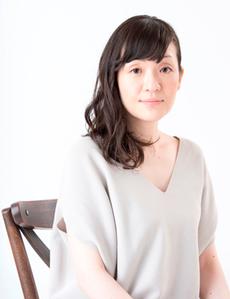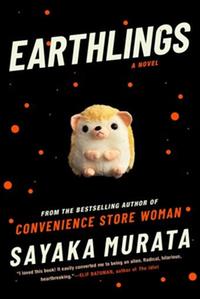
|
|
| photo: Bungeishunju Ltd. | |
Sayaka Murata is the author of many books, including Convenience Store Woman, winner of the Akutagawa Prize, and, most recently available in English, Earthlings (Grove Press, October 6, 2020). Murata has been named a Freeman's "Future of New Writing" author and a Vogue Japan Woman of the Year.
Translator's note:
Sayaka Murata read all the books referenced below in Japanese. Where a title exists in English (either original or translation), I simply give that English title and author name. Where the original title was not English and to date there is no English translation available, I give the original language title followed by an approximate English translation in parentheses. --Ginny Tapley Takemori
On your nightstand now:
Friday Black by Nana Kwame Adjei-Brenyah, recommended to me by a dear friend; Les victorieuses (The Victorious Women) by Laetitia Colombani, which I've been wanting to read for ages but never had time; Sono sugata no keshikata (How to Make It Disappear) by Toshiyuki Horie, which I like to read over and over again before going to sleep since I love his use of words.
Favorite book when you were a child:
I loved Carrot Top by Jules Renard. When I was little, the thing I hated most was when adults used stories to lecture me, since stories were my sanctuary. This book was the furthest away from this sort of thing that I had. Beyond the novel I could feel the existence of an adult even more despairing than I was. That was a lifesaver for me.
Your top five authors:
I believe that novels are only completed once they become music within their readers. I can't judge an author simply because I was not able to properly perform their music. Books that didn't resonate with me probably provided someone else with a wonderful musical score. However, the authors who have given me wonderful music, especially when I was a college student, are Rieko Matsumura, Albert Camus, Kobo Abe, Yukio Mishima and Osamu Dazai.
Book you've faked reading:
At school I read only a bit of Murasaki Shikibu's The Tale of Genji, and the rest of what I know about it I gained only by looking at pictures and hearing people talk about it. But at an event abroad, I kind of made out that I'd read the whole thing.
 Book you're an evangelist for:
Book you're an evangelist for:
I love Hiromi Kawakami's collection of stories Okina tori ni sarawarenai yo (Don't Let the Big Bird Carry You Away) and have often thought I'd like to live in this book. I always recommend The Schooldays of Jesus by J.M. Coetzee, since I want to discuss the character of Dmitri with them. Pachinko by Min Jin Lee has at last been translated into Japanese, and I was so struck by it that I tell everyone I meet about it.
Book you've bought for the cover:
Stefan Grabinski's An Eerie Tale has a gorgeous binding, and I'm entranced just by having it in my home. (It is in a box and the inside of this purple box is a beautiful red.)
Book you hid from your parents:
My parents believed that all books were a potential learning experience for children, so I was free to read whatever I liked. However, one book I simply couldn't put down despite the constant stream of terrible things happening in it was Saigo no kitsuensha (The Last Smoker) by Yasutaka Tsutsui. It was so far removed from what my parents would have considered appropriate reading for a good girl that I quietly stashed it away to avoid inadvertently giving my mother a shock.
Book that changed your life:
Kenshin (Dog's Body) by Rieko Matsuura. Ever since childhood I'd always struggled to become a proper human being, so the term "species identity disorder" came as a great relief for me. When the protagonist actually turns into a dog, I felt that I too was permitted to carry on living as a non-human, which made me really happy.
Favorite line from a book:
"If there is anything resembling sexuality within me as I am, it isn't either homosexual or heterosexual, it should be called something like--and this is a word I made up just now--dogsexual. This sexuality is the feeling of being in heaven if someone treats me affectionately, in the way a dog is treated affectionately by the human it loves. And since I'm a dog, the gender of the human doesn't bother me."
It's a bit long, but this line from Kenshin (mentioned above) liberated my soul. I could finally become, not human, but an original creature of my own.
Five books you'll never part with:
Whenever I read Chikyū ni chiribamerarete (Scattered Across the Earth) by Yoko Tawada, I feel really fond of Japanese, and feel love for the various other original languages she mentions that I don't yet know. Kohaku no matataki (The Twinkling of Amber) by Yoko Ogawa: although the world of this novel is small in size, it has unlimited breadth. Edwin Mullhouse by Steven Millhauser: when I re-read this book, I feel like my own childhood memories are being crystallized. Dance of the Happy Shades by Alice Munro: various moments in my life are shaken by this book. Ice by Anna Kavan: for some reason, being in this book makes me feel really comfortable.
Book you most want to read again for the first time:
Dove mi trovo (Where I Find Myself; Whereabouts English translation is expected in 2021) by Jhumpa Lahiri mesmerized me so much that I didn't want it to finish. The First Bad Man by Miranda July: I want to experience the same sense of exhilaration that I felt the first time I read this book. And I want to experience once again the creepiness of steadily losing track of what is "human" in Ningen sokkuri (Just Like a Real Human) by Kobo Abe.
A book that you wonder how it would turn out in English translation.
I really love Haha no hattatsu (Development of a Mother) by Yoriko Shono, but it's the sort of novel in which the author has experimented with her own unique free use of Japanese, giving the reader an unusual experience of Japanese words. A mother progressively fragments into various mothers each designated with a letter from the hiragana syllabary, and the author plays with the sounds of the syllabary to describe this process. I often ponder how this might be transposed to another language.

